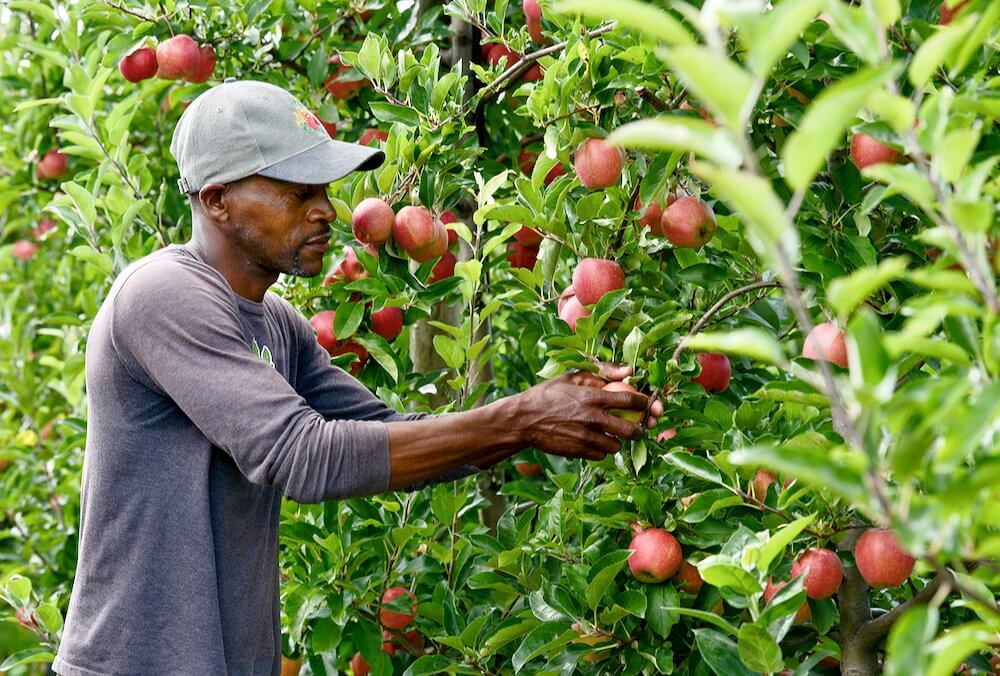By Diana Martin
Courtney Davis picks apples in Canada, but he established his agricultural roots in Jamaica.
His family has grown tomatoes, pumpkins, sweet peppers, yams and bananas on their land for generations, but farms in Jamaica are not as big as the one he works on in Norfolk County.
Davis recently shared his experience as an international foreign agricultural worker during Farm and Food Care’s first in-person farm tour since the pandemic began.
Why it matters: Many farms in Norfolk county depend on foreign agricultural workers to operate.
Davis enrolled in the Seasonal Agriculture Worker Program (SAWP) for Ontario in 2018, and skipped the next season because his initial farm contract wasn’t a good fit.
He applied again in 2020 and found work at Suncrest Orchards in Norfolk County, owned by Amanda and Hayden Dooney.
“The farm you go to, you don’t have a choice because not all bosses are nice like Amanda and Hayden,” said Davis. “Some bosses don’t even have time to talk to you.”
As first-generation farmers, the Dooneys leveraged their home’s equity in 2019 and fulfilled their dream of purchasing the neighbouring orchard, launching Suncrest Orchards. In 2020 they bought a second apple farm nearby, and the operation now consists of 80 acres producing seven varieties of apples for wholesale.
Although Hayden grew up on his family’s apple farm in New Zealand and Amanda has training as a pest management scout, jumping into a farm business dependent on a foreign workforce was daunting.
In the first year, the Dooneys retained two workers from Jamaica who had worked for the previous orchard owner.
“That first year, they were showing me how to prune apple trees because I had never done that before. I had to learn everything,” said Amanda. “I learned a lot of great skills from Georgia and Gaza.”
It hasn’t been smooth sailing for the Dooneys because of demanding off-farm work commitments, a global pandemic in 2020, an August hailstorm that destroyed their crop, and fire blight that threatened the orchard in 2021. Some might have cut their losses.
Instead, with determination and faith in the Jamaican team’s skill, Suncrest Orchards weathered each storm and came out stronger.
“It’s very challenging. I think the big thing for us is being part of a team and having a really good team to rely on and working together to support each other,” Amanda said.
A high priority for the Dooneys is to ensure staff are treated like valued parts of the business and feel at home on the farm.
“It’s very important to me that they feel like this is their second home because it should be, and it is,” she said, adding they work in Ontario eight months of the year. “We really couldn’t do it without them. A lot of farms in Norfolk couldn’t work without them. So we really appreciate having them here and working so hard for us.”
In 2021 the Dooneys gutted their existing bunkhouse and invested $120,000 into redesigning it to accommodate six to nine workers. Beyond the standard kitchen and gathering space, they added another bathroom, and each bedroom has individual heat and air conditioning and comfortable beds.
“Every farm should strive to be the best farm, the desired place to have employment, that people want to go there and work,” she said. “If these guys leave – they find a better opportunity elsewhere – we support them. But in the meantime, we want to be the best place to work.”
When Davis approached them last year about applying for permanent residency, the Dooneys enrolled him in the two-year Temporary Foreign Worker (TFW) program, provided year-round employment and paid for his immigration paperwork.
Amanda said most of her workforce has no desire to remain in Canada, preferring to return home to their families in the off-season. Still, she believes it’s important to facilitate those who want to stay in Canada and contribute their skills.
“I look for people who are really driven and want to succeed and put that time in while they’re here,” she said. “And once he (Davis) has his permanent residence, he can work here or go somewhere else.”
The Dooneys strive to make their workers feel valued. They consider their input in orchard management and are considerate of their personal needs, said Davis.
The Dooneys regularly gather with the men, share recipes and cultural dishes and celebrate important days and milestones. They even buy the men goats to harvest for special occasions so they can enjoy traditional dishes.
“I told them when I get my permanent residency, I’m going to give them two- or three-years’ service before I leave,” said Davis. “If I even leave, I’m planning to go to Hamilton. When I’m there, whenever they have work, and I’m not working – I’ll be here. That’s how I feel about it.”
Because that’s what you do for family, he said.


